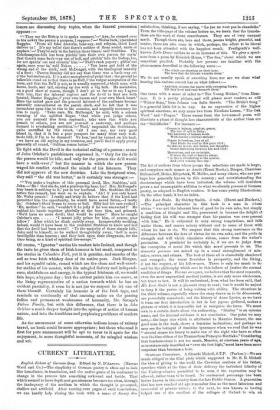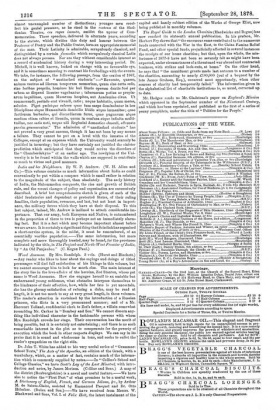Orationes Creweiance. A Ricardo Michell, S.T.P. (Parker.)—We are much obliged
to the filial piety which suggested to Mr. E. B. Michell the idea of giving to the world the Creweian orations of his father, speeches which at the time of their delivery the turbulent hilarity of the Undergraduates permitted to be seen, if the expression may be allowed, rather than to be heard. No academical personage has been better known in this country than the late Public Orator. A generation that has now reached old ago remember him as the most laborious and successful of private tutors ; to the next, be was known as having helped one of the smallest of the colleges of Oxford to win an almost unexampled number of distinctions; younger men recol- lect his genial presence, as he stood in the rostrum of the Shel- donian Theatre, ceu rupes inanota, amidst the uproar of Com- memoration. These speeches, delivered in alternate years, according to the statute, which divides this duty and honour between the Professor of Poetry and the Public Orator, form an appropriate memorial of the man. Their Latinity is admirable, scrupulously classical, and distinguished by a certain facundia which scrupulously classical Latin does not always possess. Nor are they without considerable interest as a record of academical history during a very interesting period. Dr. Michell, it is well known, looked on change with no favourable eye, and it is sometimes amusing to contrast his forebodings with the events. We take, for instance, the following passage, from the oration of 1867, on the subject of "unattached students" :—" Revocate, quaeso, animos vestros ad illorum temporum memoriam, qui= sine certa sede, sine laribus propriis, homines hic loci literis operam dantis fusi per urbem ac dispersi Reenter vagabantur ; tabernarnm potius ac propin- arum inquilinae, quam Musarum hospites, ant Academia° cives. Ut commorandi, perinde erat vivendi, ratio ; neque habitatio, quam mores, solution Piget pudetque referre quae tam nape dominabatur in hoe Disciplinae atque Humanitatis domicilio libido atque immanit,as; qua() factionum barbaries, qui discordiarum furor, quae pugnarum atque caedum etiam rabies et licentia, quum in confuse atque infinite multi- tudine, nec antis noti, neque ulli Regimini domestico obnoxii, effronate passim grassarentur." The admission of "unattached students" has not nroved a very groat success, though it has not been by any means a failure. They cannot be put on a level with the inmates of the Colleges, except at an expense which the University would scarcely be justified in incurring ; but they have certainly not justified the sinister prediction which anticipated that they would revive the disorders of the" Chamberdekyns " of an earlier age. The rowdyism of tho Uni- versity is to be found within the walls which are supposed to contribute so much to virtue and good manners.































 Previous page
Previous page